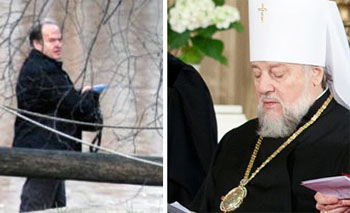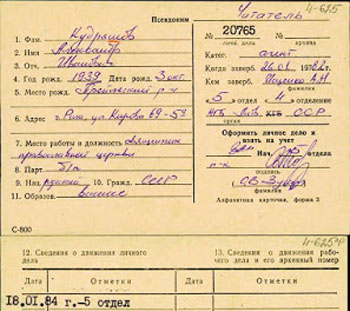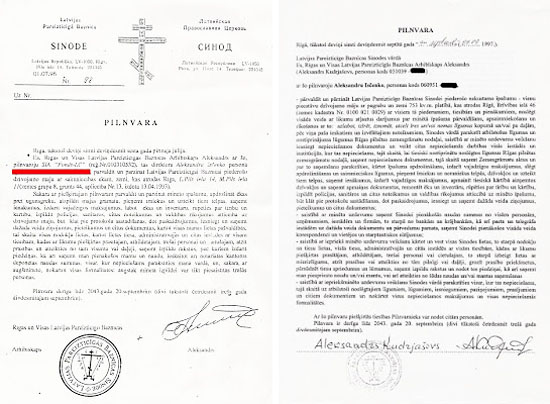Theology of History
 |
 |
 |
 |
 |
 |
 |
The ‘Orthodox’ Masquerade - IV
Head of Latvian ‘Orthodox’ Church
Is a KGB Agent
From Poland I received the information that the Latvian National Archive recently made public the secret files of 10,612 persons registered as KGB agents in the Socialist Soviet Latvian Republic.
 The highlight of the list was given to the “Orthodox” Metropolite of Riga, Alexander Kudryashov. It was not a surprise for me to see he was an agent, since I knew that all the leaders of the Russian Schismatic Church had been replaced by KGB agents, as I demonstrated in other articles. So, it is not extraordinary to learn that something analogous happened in Latvia.
The highlight of the list was given to the “Orthodox” Metropolite of Riga, Alexander Kudryashov. It was not a surprise for me to see he was an agent, since I knew that all the leaders of the Russian Schismatic Church had been replaced by KGB agents, as I demonstrated in other articles. So, it is not extraordinary to learn that something analogous happened in Latvia.
Kudryashov’ membership in the Latvia KGB, which became public with many documents corroborating it, shed some light on the communist system of recruiting new people. In 1982, he was a barman in a popular pub in central Riga – hardly a job where religious vocations tend to sprout – when he was enrolled as a KGB agent.
 Soon afterward he was assigned to become a priest; in 1989 he was made bishop. In Latvia there was no “Orthodox” Church at the time. The majority of that country was Catholic; one-third of the population had been deported to the Russian camps of extermination, which were constructed immediately after Stalin invaded that small country.
Soon afterward he was assigned to become a priest; in 1989 he was made bishop. In Latvia there was no “Orthodox” Church at the time. The majority of that country was Catholic; one-third of the population had been deported to the Russian camps of extermination, which were constructed immediately after Stalin invaded that small country.
It was only in 1989 with the fall of the Soviet Union that the Russians created this false Church in Latvia that was subordinate to the Schismatic Russian Church.
It is interesting that the communist network survived the official collapse of the USSR. The KGB officer Alexander Iscenko, director of the Department of Religious Affairs in Latvia, received from Metropolite Kudryashov the power to manage religious buildings belonging to the “Orthodox” Church and to receive their rents.
After Latvia’s independence in 1991, a law was approved returning to the Latvian “Orthodox” Church the properties that had been appropriated by the Russians. In this case, the law was unjust because that Church did not even exist before 1989.

Continued

Left, KGB lieutenant-colonel Iščenko (photo: Kompromat.lv); right, Metropolite Kudryashov
Kudryashov’ membership in the Latvia KGB, which became public with many documents corroborating it, shed some light on the communist system of recruiting new people. In 1982, he was a barman in a popular pub in central Riga – hardly a job where religious vocations tend to sprout – when he was enrolled as a KGB agent.

Card of Metropolite Kudryashov as a KGB agent
It was only in 1989 with the fall of the Soviet Union that the Russians created this false Church in Latvia that was subordinate to the Schismatic Russian Church.
It is interesting that the communist network survived the official collapse of the USSR. The KGB officer Alexander Iscenko, director of the Department of Religious Affairs in Latvia, received from Metropolite Kudryashov the power to manage religious buildings belonging to the “Orthodox” Church and to receive their rents.
After Latvia’s independence in 1991, a law was approved returning to the Latvian “Orthodox” Church the properties that had been appropriated by the Russians. In this case, the law was unjust because that Church did not even exist before 1989.

Left, power of attorney given to KGB agent Alexander Iščenko, 1996; right, same power given by Metropolite Kudryashov to Iščenko, 1997- Source: Kompromat.lv
Continued

Posted January 30, 2019
______________________
______________________



